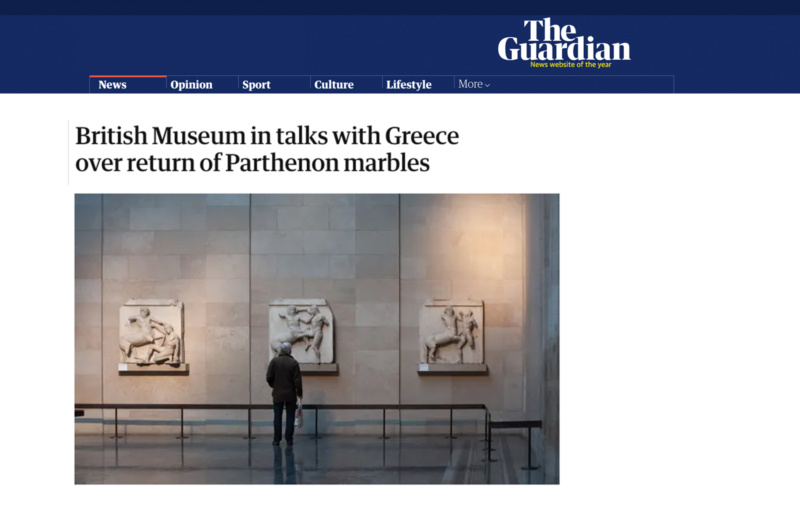The British Museum has confirmed for the first time that it is involved in “constructive discussions” with Greece over the return of some of the Parthenon marbles.
Speculation has been intensifying over recent months that a deal could be struck to return some of the marble sculptures, which have been on display in the British Museum since 1832 after being controversially stripped from the Parthenon by Lord Elgin, a British diplomat.
Senior Greek ministers confirmed last month that secret talks between the museum’s chairman, George Osborne, and the Greek government have been ongoing for more than a year. On Wednesday, the Telegraph reported that an agreement had been drawn up between the two parties that could lead to some items returning on loan early this year.
However, Greek sources have indicated that the two parties are still some distance apart. A well-placed senior Greek official told the Guardian on Wednesday: “This is not true. there is no such deal.”
The museum said in a statement: “We’ve said publicly we’re actively seeking a new Parthenon partnership with our friends in Greece and as we enter a new year constructive discussions are ongoing.”
While Osborne has been open for some time about his willingness to strike a deal to break the deadlock over the highly contested sculptures, the museum has not before now confirmed that discussions were actively under way.
Greece has long insisted it wants the marbles back permanently. However, the British Museum’s firm position is that any potential agreement would only see items returned on loan. The British government said last month it had no intention of amending the British Museum Act, the law that prevents the museum from returning any of its collection permanently except in very limited circumstances.
“We’re not going to dismantle our great collection as it tells a unique story of our common humanity,” the museum said in a statement at the time.
The museum will shortly announce details of a long-planned £1bn modernisation plan called the Rosetta Project, in which there will be a “complete reimagination” of the museum and a major renovation of many of its galleries.
The Parthenon galleries, which have been in a poor state of repair for some time, are expected to be prioritised for refurbishment, which could offer a convenient moment to lend some of the items to Greece if agreement can be reached.
Greek and international calls for the sculptures’ permanent return, which has been building over recent years, are unlikely to be satisfied by a loan, however. Last month, the Vatican gave back three Parthenon sculptures from its collection to Greece, saying the donation was “a concrete sign of [Pope Francis’s] sincere desire to follow in the ecumenical path of truth”.
A spokesperson for the Parthenon Project, which campaigns for the sculpture’s return to Athens, said it welcomed signs that “a solution to this long-standing issue is finally within reach”.
“We have argued for a deal that is beneficial to both Greece and Britain, centred on a cultural partnership between the two countries. This would see the British Museum continue in its role as a ‘museum of the world’ displaying magnificent Greek artefacts as part of rotating exhibits, with the Parthenon Sculptures reunited in their rightful home in Athens.”
How Can You Get Involved?
If you would like to join the efforts to reunite the Parthenon Sculptures in Greece through a cultural partnership and receive emails with campaign updates from Pagefield Communications, please subscribe below.
For press enquiries, please contact Pagefield Communications at parthenonproject@pagefield.co.

